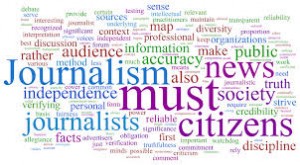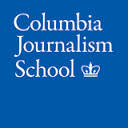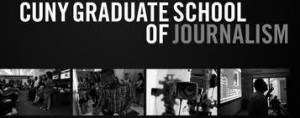Journalism, like teaching, does a tremendous public service. The strength of democracy in any society is usually measured by its treatment of journalists: a country that’s unsafe for journalists is usually considered to be a country that’s trying to hide the truth about itself.
 Yet, journalism is becoming more and more difficult (if not impossible) to consider as a career choice. This trend is related to the same changes wrought by the information technology that became ubiquitous over the past twenty years and its impact on our access to data, news, and government sources. If we think of journalists as those who gather large amounts of information, process it, and present it to the general public, we could conclude that their role has become obsolete. Since we have our own direct access to enormous amounts of information, we might as well process it and present it to ourselves.
Yet, journalism is becoming more and more difficult (if not impossible) to consider as a career choice. This trend is related to the same changes wrought by the information technology that became ubiquitous over the past twenty years and its impact on our access to data, news, and government sources. If we think of journalists as those who gather large amounts of information, process it, and present it to the general public, we could conclude that their role has become obsolete. Since we have our own direct access to enormous amounts of information, we might as well process it and present it to ourselves.
This kind of thinking would explain why many people are unwilling to pay for access to newspaper journalism. On the assumption that they could get the same information elsewhere, they assume that the work of journalists consists in copying information from primary sources. This, however, is not accurate: the difference between good journalism and any information available is in the expertise journalists hone over many years of research, education, and training, in recognizing important social issues, approaching the best sources of information about that issue, assessing the quality of information that circulates about their story, and writing in a way that clarifies (to the greatest possible number of readers) the significance of the story. The best work of journalism creates communities that recognize how they become united around a story of common interest. One place where you can test these ideas and get a taste of what the work of journalists involves is the school paper, the John Jay Sentinel.
Although the value of good journalism remains unchanged, the availability of careers in journalism has shrunk dramatically. Ann Neumann, a professional journalist (who also has a regular office job), explains what it is that puts journalism under so much strain and why it may be a great risk to look to fulfill all of one’s ethical and personal ideals by becoming a journalist.
Internet Journalism
 Much of the best journalism is now available online, either because all reputable news sources have their online editions, or because new sources emerged which only appear on the Internet. Some of these sources appeared in order to meet the need for independent reporting. Others, however, have turned ease of access and speed of circulation into a business. This is why it often isn’t entirely clear what counts as professional journalism and reporting online. Some websites, such as Gawker, pay their writers by the number of readers they attract to the site, so the writers’ best interest is not necessarily the quality of information they put into the public, but the ease of access and the speed with which they circulate their information. In cases when their information turns out to be misinformation (or just plain rumor), the business model still benefits because corrections and additions bring additional traffic to the website.
Much of the best journalism is now available online, either because all reputable news sources have their online editions, or because new sources emerged which only appear on the Internet. Some of these sources appeared in order to meet the need for independent reporting. Others, however, have turned ease of access and speed of circulation into a business. This is why it often isn’t entirely clear what counts as professional journalism and reporting online. Some websites, such as Gawker, pay their writers by the number of readers they attract to the site, so the writers’ best interest is not necessarily the quality of information they put into the public, but the ease of access and the speed with which they circulate their information. In cases when their information turns out to be misinformation (or just plain rumor), the business model still benefits because corrections and additions bring additional traffic to the website.
Journalism Education
Two highly esteemed schools of journalism are here in New York and they admit new students every year.
 Columbia School of Journalism offers Master’s and Ph.D. degrees in Journalism and Communication. In their Master of Science degree, which focuses on teaching basic reporting, they offer “aspiring and experienced journalists the opportunity to study the skills and priniciples of journalism in a digital world using words, data, images and sound. Using New York City as their laboratory, students in the M.S. program learn how to think critically and deeply, to be both ethical and street smart. Experienced journalists are your teachers, and they critique assignments and closely supervise your work.”
Columbia School of Journalism offers Master’s and Ph.D. degrees in Journalism and Communication. In their Master of Science degree, which focuses on teaching basic reporting, they offer “aspiring and experienced journalists the opportunity to study the skills and priniciples of journalism in a digital world using words, data, images and sound. Using New York City as their laboratory, students in the M.S. program learn how to think critically and deeply, to be both ethical and street smart. Experienced journalists are your teachers, and they critique assignments and closely supervise your work.”
 CUNY Graduate School of Journalism offers a Master of Arts in Journalism. They say their “goal is to attract a diverse group of the highest caliber aspiring journalists.” Whoever their prospective students are, they should bring to the programs “demonstrated writing proficiency and a knack for storytelling, a broad-based undergraduate education encompassing a variety of academic disciplines, a passion for current events and a commitment to journalism.”
CUNY Graduate School of Journalism offers a Master of Arts in Journalism. They say their “goal is to attract a diverse group of the highest caliber aspiring journalists.” Whoever their prospective students are, they should bring to the programs “demonstrated writing proficiency and a knack for storytelling, a broad-based undergraduate education encompassing a variety of academic disciplines, a passion for current events and a commitment to journalism.”


